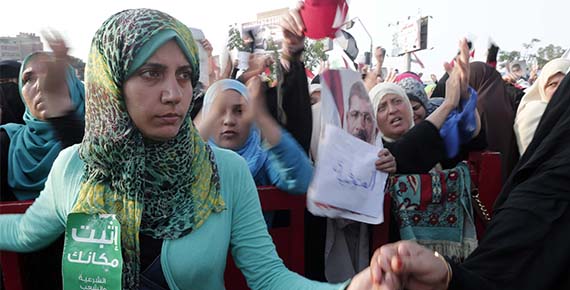The change in Egypt, which is expected to be ended with the least damage, has turned into a heavy military intervention beyond anticipation and interrupted the process of democracy. The massacre that took place in front of the Presidential Guards Regiment is put on the record as a critical breaking point for the junta and the Egyptian people.
The President Appointed Adli Mansour issued a new Constitutional Declaration on July 9, 2013. The political wing of the Muslim Brotherhood (Ikhwan) the Freedom and Justice Party (FJP), and the Building and Development Party, formed by the Jamaat al Islamiyya, flatly rejected the declaration as the political wing of the Salafis, the Nour Party, found the blueprint acceptable.
Although Mohammed al Baradei and Amr Mousa positively approached the declaration, they objected to the items about the elections. The strongest reaction to the declaration, presumably, came from the FJP. The party threatened to boycott the elections, repeating that the President Mohammed Morsi must be released.
The second largest political party of Egypt, the Nour, prefers to remain in the frame of the road map declared by the military. After the massacre in front of the Republican Guards Regiment, the party administration announced its withdrawal from the “road map;” however, stepped back following the pressure from Saudi Arabia.
The first crack among the parties regarding this process has occurred during the Constitutional Declaration. Even the Tamarud (Revolt) Movement reacted against the Declaration. Previously, the Azhar Sheikh Ahmad Tayyib and the Copt religious leader Tavadros had opposed the arrests. Seclusion of the two religious leaders drew attention, both of whom took a stand against the Republican Guard Regiment massacre.
The developments in Egypt should be classified into two as before and after June 30. The democratization process has been interrupted; the first president elect of the country was ousted through anti-democratic ways. This is an undeniable fact. Along the process, the Muslim Brotherhood’s maintaining its struggle through peaceful ways is legitimate and should be applauded.
Those who supported the process at the beginning have started to re-evaluate their attitude after the pro-Mubarak groups, who are known as the “Fulul” in Egyptian, took the stage again. The April 6 Youth Movement reacted against the administration after the massacre. Besides, a constitutional referendum and parliamentary and presidential elections will be held in the next six months. This process is in favor of the Ikhwan. If the conciliation is reached, the Muslim Brotherhood may have an opportunity to regroup.
THE SAD END OF MOHAMMED NAJIB
The first president inaugurated after the Free Officers Revolution in 1952 was Mohammed Najib. He was dismissed 1.5 years later by his friends who were involved in the coup and put under house arrest. He was told to be released a few days later, but was kept in 30 years in the Zaynab al Vakil Villa. Until the ousted Hosni Mubarak period, Najib’s name was not even included in the text books as the “first president of Egypt.” Najib was not even allowed to attend his son’s funeral ceremony in Germany and had to wash his clothes on his own for years. Najib’s remark “If I leave the post this way, Sudan will split from Egypt” is not forgotten. It did happen indeed and Sudan was taken apart from Egypt.
In some of the backstage conversations, the possibility of Morsi’s return is being discussed. However, his coming back to power again is even difficult to dream. Even if this slightest possibility becomes the reality, Morsi cannot remain in the post. What is important in this process is the release of Morsi and not his being kept in as Najib was.
TURKEY-EGYPT RELATIONS AFTER THE INTERVENTION
The relations between the two countries in the 1950s were broken in no small measure. That period lasted about 30 years, until Mubarak&r









